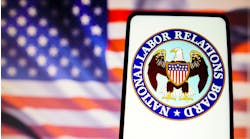A recent decision by the National Labor Relations Board (NLRB) bans employers from holding “captive” meetings with their employees about union organizing while at the same time threatens employers’ ability to communicate with their workers in other ways.
“Ensuring that workers can make a truly free choice about whether they want union representation is one of the fundamental goals of the National Labor Relations Act (NLRA),” declared Lauren McFerran, NLRB’s chairperson. “Captive audience meetings—which give employers near-unfettered freedom to force their message about unionization on workers under threat of discipline or discharge—undermine this important goal.”
An employer’s ability to compel attendance at such meetings on pain of discipline or discharge lends a coercive character to the message regarding unionization that employees are forced to receive, the board concluded. “The employer’s ability to require attendance at such meetings demonstrates the employer’s economic power over its employees and reasonably tends to inhibit them from acting freely in exercising their rights.”
The NLRB wasn’t shy about seeking to limit what employers can talk about. “The board majority seems to have narrowed the circumstances under which an employer may publicize existing benefits and rely on ‘past practice’ to solicit employee grievances during a union campaign,” explain attorneys Rachel Ring, Maura Mastrony and Min Song of the law firm of Littler Mendelson.
The decision also represents the latest chapter in the ongoing saga of the thus-far largely unsuccessful campaign by unions to organize Amazon’s extensive warehouse and distribution operations. Over the years, this drive is believed to have spurred the company to boost wages and benefits, and strengthen its safety practices.
This particular case began in 2021 when the Amazon Labor Union kicked off a campaign to organize two of the company’s warehouse and fulfillment facilities on Staten Island, NY. Amazon then held informational meetings with employees where the organizing and election process was discussed, along with Amazon’s view that unions were not necessary.
At the same time, the company discussed its “Open Door Policy” and other direct communication avenues it said employees benefitted from, including digital message boards where employees could post messages for review by and responses from management and other employees. Amazon encouraged employees to use these communication channels to make management aware of concerns employees believed were not being addressed to their satisfaction.
In the NLRB’s view, these meetings were mandatory for the Amazon employees, meaning that they could face discipline if they did not choose to attend, and concluded those are illegal. This represents a change from a previous board policy allowing these kinds of meetings that had been in effect for 76 years.
This decision marks a significant change for employers wanting to hold similar captive audience meetings in the future, says attorney Cassidy Zang of the Bricker Graydon law firm. “Under the new rule, employers may not require employees to attend captive audience meetings,” she noted. “Even if the employer supports unionization efforts and wants to inform its employees that they have management’s support, the meeting cannot be mandatory.”
During the organizing effort, some employees left messages on digital message boards supporting the union, which violated the employer’s lawful no-solicitation policy. These employees were told they would not be disciplined for the postings but were allegedly also told that further posts in violation of the policy would lead to “additional follow up.”
Don’t Solicit Grievances
The decision also emphasizes that the board from now on intends to forbid solicitation of employee grievances during a union organizing campaign, which can be seen as improperly implying that an employer is promising to remedy the grievance solely to weaken union support, Ring, Mastrony and Song observe.
The board held that the employer unlawfully solicited employee grievances when its managers and supervisors simply promoted the company’s “Open Door Policy” and various other methods of employee direct communication with management.
During the organizing effort, some employees left messages on digital message boards supporting the union, which violated the employer’s lawful no-solicitation policy, the Littler Mendelson attorneys added. These employees were told they would not be disciplined for the postings but were allegedly also told that further posts in violation of the policy would lead to “additional follow up.”
The NLRB made it clear that it believes mandatory employee meetings interfere with an employee’s right to decide whether or not they want to participate in unionization efforts. Compelling attendance is seen as coercive, and directly impacts the message employees are forced to receive at the meeting. The board also said such meetings are a mechanism for employers to surveil employees, specifically an employee’s exercise of their right under federal law to discuss wages and working conditions.
“The board’s narrow definition of ‘voluntary’ raises practical problems for employers who want to hold any meetings with employees about unions,” say attorneys with the law firm of Frost Brown Todd. “Employers will find it difficult to give their workers a convenient meeting opportunity if this meeting cannot be included in employees’ work schedules.”
The board also held that Amazon had violated the NLRA because it “emphatically” urged employees to use these systems until they got a resolution, which the board considered a departure from prior practice.
Zang asserts that employers can continue to hold such meetings, but only under certain circumstances. Although employers may still use captive audience meetings to communicate with employees regarding unionization efforts, she says the workers must receive reasonable advance notice of the meetings.
In addition, that notice must be written in such a way that it informs the employees concerning the meeting’s subject matter, and explicitly states that their attendance is voluntary, it will not be recorded and there will be no adverse employment action taken against any employees if they choose not to attend.
There is some good news in the decision for employers who may have already violated these standards while grappling with organizing campaigns The board made clear that this change in the governing standard will be applied prospectively only—not retrospectively—to appropriately accommodate the reasonable reliance employers may have previously placed on the NLRB’s decades-old precedent prior to the Nov. 13 issuance of the Amazon Services decision.
Although it is considered a near certainty that President-elect Donald Trump will replace the current NLRB general counsel (something President Joe Biden chose to do on his Inauguration Day in 2021), the pro-union majority of NLRB board members could remain in place until 2026 when some of the sitting members’ staggered five-year terms come to an end.
“It is important for employers to be aware of and account for new precedent in their legal risk management and employee engagement training efforts,” warn Ring, Mastrony and Song. “A more targeted and comprehensive approach to training may be appropriate,” they say, “including additional training on this topic with human resources, labor relations, managers and supervisors.” This should include opportunities to review and update employee communications used during organizing and evaluating existing feedback channels (or the possible addition of new ones) to ensure employees are aware of and making use of them to address their concerns.




